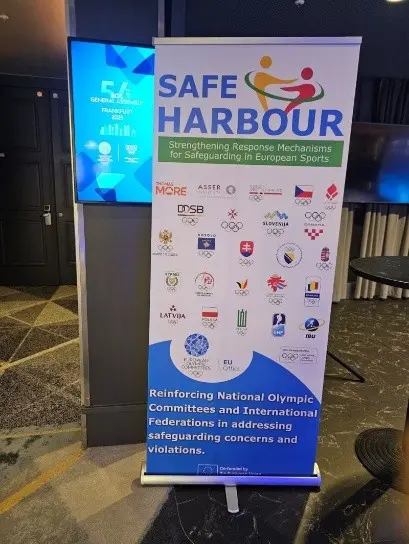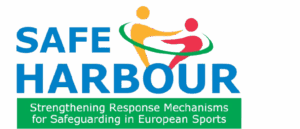
From 28 February to 1 March 2025, the 54th European Olympic Committees (EOC) General Assembly took place in Frankfurt, Germany. Amidst the special atmosphere of key leadership elections, the EOC EU Office actively participated with a dedicated stand, strengthening cooperation with European National Olympic Committees (NOCs) and promoting valuable resources developed through European projects.
Among the EOC EU Office's flagship projects, SAFE HARBOUR was prominently showcased. The SAFE HARBOUR project will establish a European Response Framework to guide NOCs and Federations in handling safeguarding concerns, complemented by national strategies to ensure locally tailored responses across European NOCs. Furthermore, within the SAFE HARBOUR project, the European Network of Safe Sport is established to facilitate cooperation among project partners and all European NOCs to unanimously and effectively address safeguarding violations and concerns.
Therefore, the EOC General Assembly provided a key platform to highlight partners NOCs' commitment to safeguarding, demonstrating their proactive role in addressing these critical issues. Besides, it also served as an opportunity to inspire other NOCs and Federations within the Olympic Movement to join the SAFE HARBOUR network; thus, reinforcing collective efforts to enhance response mechanisms for safeguarding violations and concerns and encouraging a safer and more supportive environment in European sport.
Stay tuned to find out more about the SAFE HARBOUR project via its media channels: website and LinkedIn.
Background information on the SAFE HARBOUR project.
The SAFE HARBOUR project, short for "Strengthening Response Mechanisms for Safeguarding in European Sport", is a 30-month project co-funded by the European Union through the Erasmus+ Sport Programme 2024. Coordinated by the EOC EU Office, the consortium includes Thomas More and Asser Institute as experts on safeguarding, human rights and law, 2 International Federations (International Biathlon Union and International Ice Hockey Federations), and 20 National Olympic Committees (Belgium, Bosnia and Herzegovina, Croatia, Cyprus, Czechia, Denmark, Germany, Hungary, Kosovo, Latvia, Lithuania, Luxembourg, Malta, Montenegro, Norway, Poland, Portugal, Romania, Slovakia and Slovenia). Additionally, the International Olympic Committee (IOC) is involved as an outside resource.
The project seeks to strengthen the capacity of European NOCs and Federations to address safeguarding concerns by identifying gaps, developing a European Response framework, and fostering collaboration. This framework will be adapted to national contexts, complemented by training and awareness initiatives to enhance safeguarding measures at both national and European levels. Therefore, SAFE HARBOUR aims to equip partner NOCs and Federations with the tools and confidence to implement effective safeguarding measures while establishing a robust support network for Safeguarding Officers and laying the groundwork for a future IOC Regional Safeguarding Hub.

![]()
